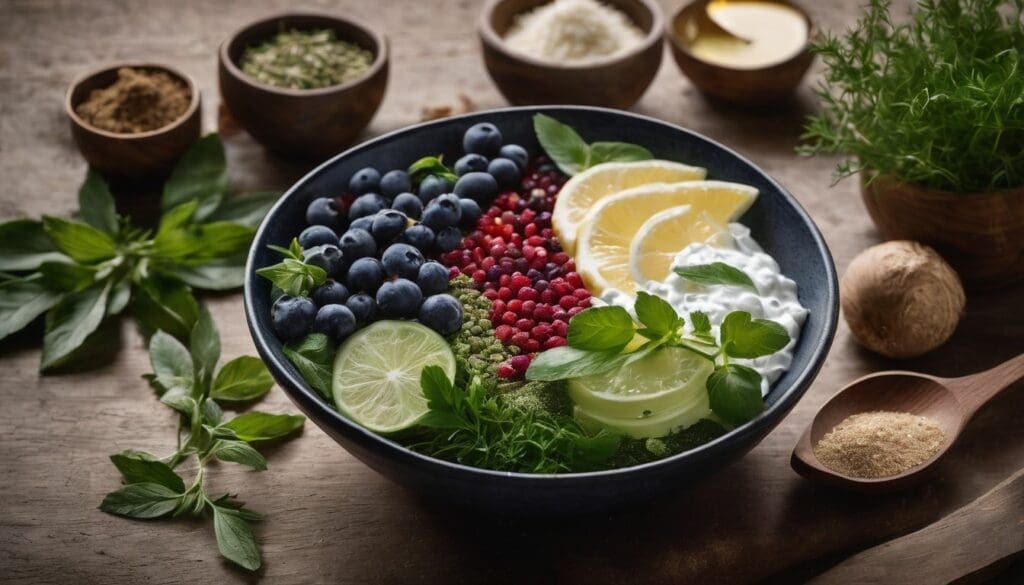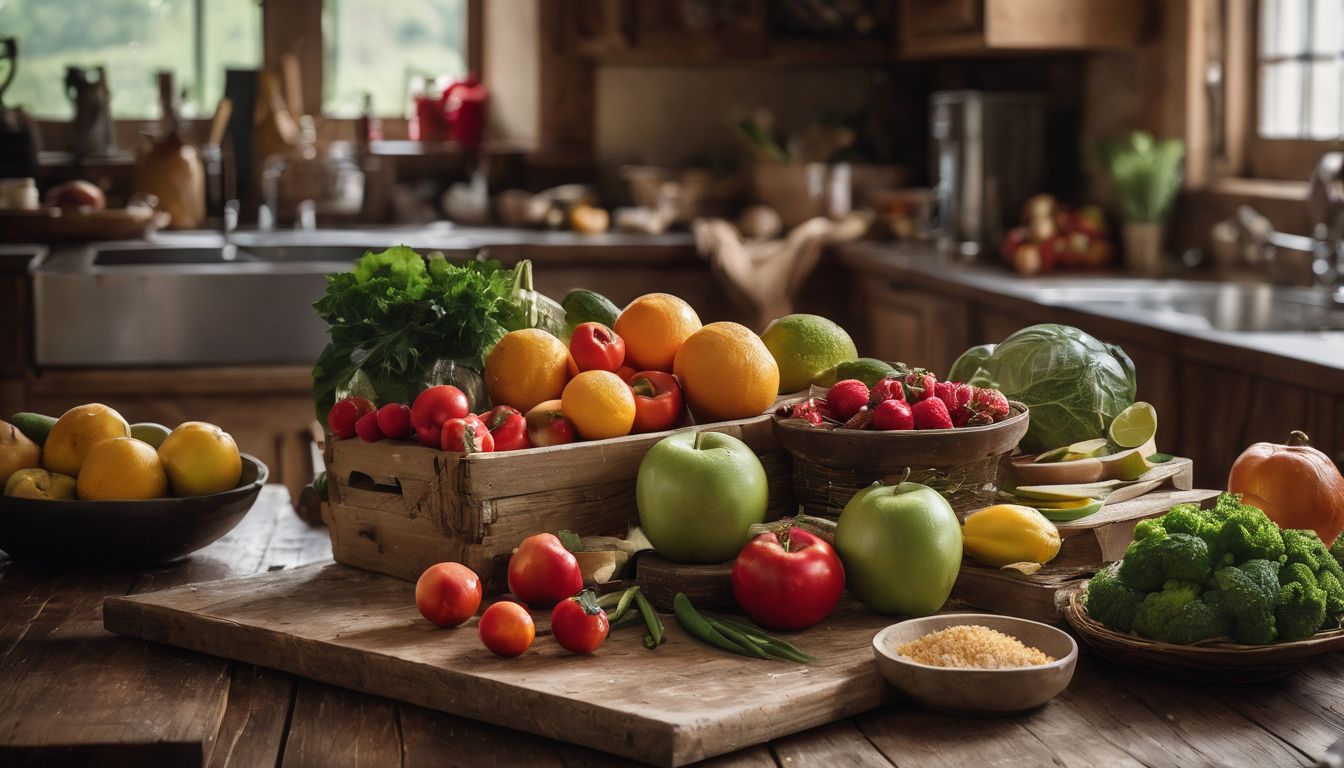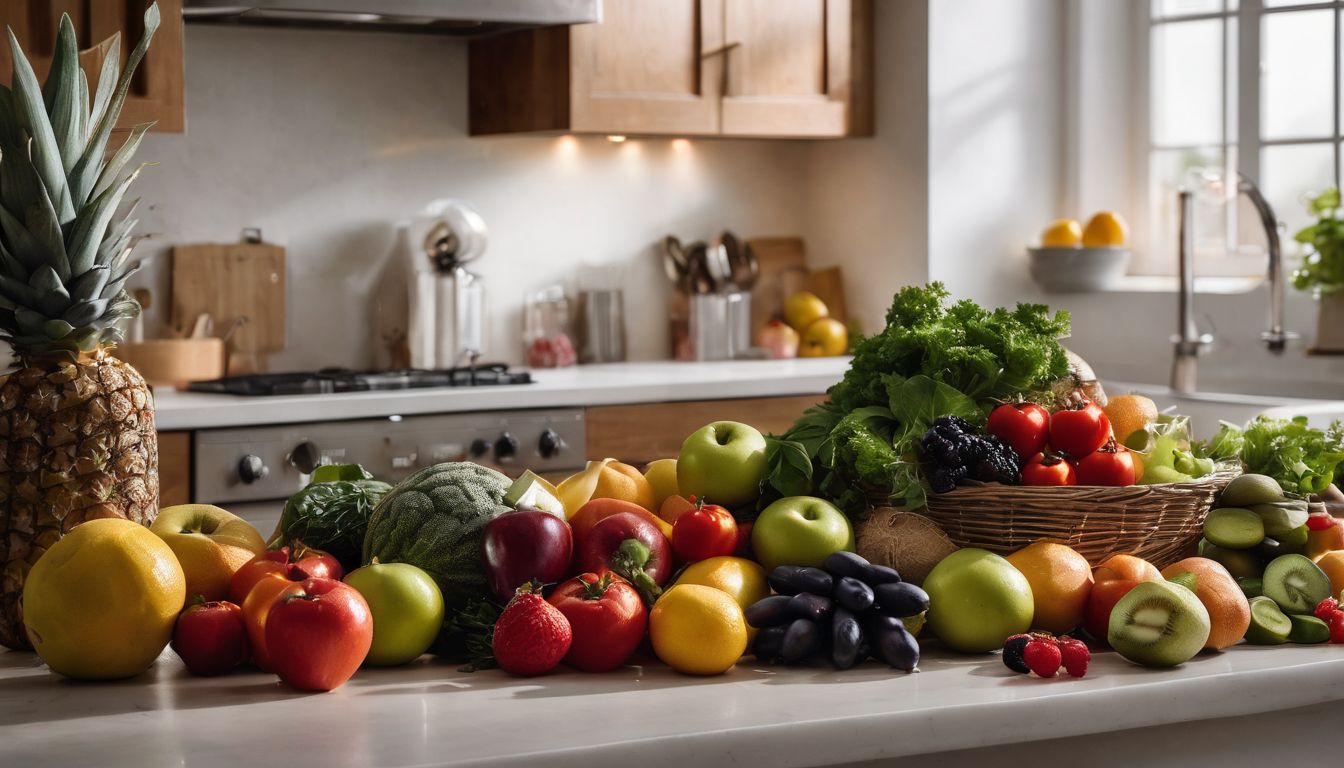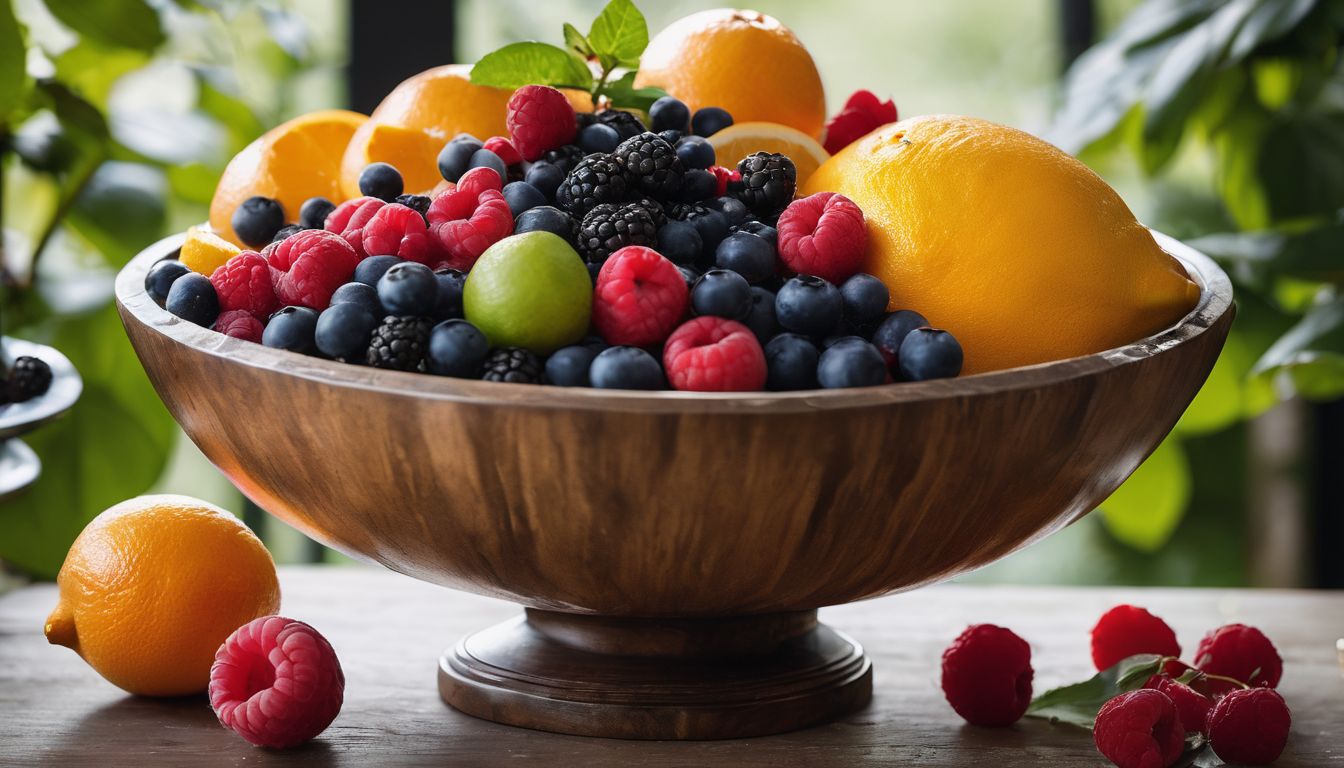Are you struggling to keep your skin looking radiant and healthy? Most of us underestimate the power of natural remedies in achieving that perfect glow. Our guide will unveil easy-to-follow steps and homemade recipes for a sustainable, natural skincare routine.
Discover true beauty below!
Key Takeaways
- Adopting a natural skincare routine can help avoid harsh chemicals and support holistic wellness by using ingredients like plant oils, herbs, and essential oils that benefit skin health.
- Cleansing, toning, exfoliating, applying eye cream, moisturising, and protecting the skin from the sun are key steps in maintaining a healthy natural skincare regimen suitable for various skin types.
- DIY recipes such as an oatmeal mask for clarifying skin, a tea leaves toner for refreshing after cleansing and a sugar scrub for gentle exfoliation provide affordable and eco-friendly alternatives to store-bought products.
- Safety measures like diluting essential oils properly with carrier oil, performing patch tests before use of new products and managing stress through relaxation techniques contribute significantly to overall skin health.
- Other factors affecting healthy skin include following a balanced diet rich in antioxidants and omega-3s, avoiding harmful habits such as smoking or tanning excessively and having regular dermatologist check-ups.
Understanding Natural Skin Care
Natural skin care involves using natural, plant-based ingredients to nourish and protect the skin. It offers benefits such as reducing exposure to harsh chemicals and promoting a healthier environment.
Different skin types require different care routines, so it’s important to understand what works best for your specific needs.
4. Natural DIY Skin Care Recipes:.
Definition
Natural skin care involves the use of products formulated with ingredients sourced from nature, rather than synthesised compounds. These items typically feature plant-derived components such as oils, herbs, flowers, and essential oils that are chosen for their benefits to the skin’s health.
Embracing organic skincare tips means selecting treatments and routines that nourish and support the skin without relying on harsh chemicals or artificial additives.
By adopting a daily skincare routine centred around these natural remedies, individuals contribute to both their personal well-being and the broader cause of environmental conservation.
Products categorised under this approach exclude substances like parabens, sulfates, or synthetic dyes which can be damaging to ecosystems when washed away after use. Choosing homemade skincare not only promises a gentle touch for your complexion but also aligns with an eco-friendly lifestyle by reducing ecological footprints and supporting sustainable practices within beauty regimens.
Benefits
Natural skin care routines have numerous benefits for your skin health. By using natural ingredients, you can avoid harsh chemicals and potential irritants that may cause adverse reactions.
Natural products also tend to be more environmentally friendly, promoting sustainability and conservation efforts. Incorporating a natural skincare routine into your daily regimen can help maintain a healthy balance in the skin’s natural oils, leading to a radiant, glowing complexion.
Moreover, embracing natural care routines often supports the concept of holistic wellness, focusing on not just external beauty but overall health and wellbeing. By choosing natural skincare products and DIY treatments, you contribute to the reduction of chemical waste in waterways and ecosystems.
Embracing these practices aligns with sustainable living ideals while nurturing your skin from within.
Different Skin Types and How to Care for Them
Skin types: Normal, oily, combination, dry, and sensitive.
- For normal skin: Use a gentle cleanser and light moisturiser to maintain balance. Regular exfoliation helps to keep the skin smooth.
- For oily skin: Choose non-comedogenic products to avoid clogging pores. Use a gentle foaming cleanser and oil-free moisturiser. Exfoliate regularly to prevent breakouts.
- For combination skin: Use a mild cleanser and lightweight moisturiser on the entire face. Apply a targeted treatment for oilier areas and use a hydrating product for drier areas.
- For dry skin: Look for creamy or oil-based cleansers and rich moisturisers with ingredients like hyaluronic acid or shea butter to hydrate the skin. Gently exfoliate to remove dead skin cells without over-drying.
- For sensitive skin: Opt for fragrance-free, hypoallergenic products that are gentle on the skin. Use a mild, non-irritating cleanser and soothing moisturiser with calming ingredients like chamomile or aloe vera.
Simple Steps for a Natural Skin Care Routine
Cleansing, toning, and moisturising are the basic steps to a natural skin care routine. Following these simple steps can help maintain healthy and radiant skin.
Cleansing
To maintain healthy skin, using natural and environmentally friendly cleansing products can help. Cleansing removes dirt, oil, and impurities from the skin’s surface, preventing breakouts and dullness.
Natural ingredients such as oatmeal, honey, or aloe vera are gentle on the skin while effectively cleaning it. These ingredients also support environmental sustainability by reducing the use of harsh chemicals that harm ecosystems.
Consistent cleansing is vital for maintaining healthy and glowing skin naturally. Removing pollutants from the skin’s surface not only prevents acne but also supports overall wellness.
Toning
Upon completing cleansing, the next step in your natural skincare routine is toning. Toning helps to balance the pH levels of your skin and remove any remaining traces of dirt or makeup.
Using a gentle, natural toner can help tighten pores and prepare your skin for better absorption of moisturisers and serums.
For an environmentally conscious approach, opt for homemade toners using ingredients like green tea, rose water, or witch hazel. These natural alternatives not only promote healthy skin but also reduce reliance on harsh chemicals found in many commercial products.
Incorporating toning into your daily skincare regimen will contribute to a healthy, radiant complexion while minimising environmental impact from excessive packaging and chemical waste.
Exfoliating
After toning your skin, exfoliating is the next step in your natural skincare routine. Exfoliation helps to remove dead skin cells, unclog pores, and improve the overall texture of your skin.
Using a gentle exfoliant can help promote healthy cell turnover and reveal a fresh, glowing complexion. Whether you choose a physical scrub or a chemical exfoliant like alpha hydroxy acids (AHAs) or beta hydroxy acids (BHAs), regular exfoliation can enhance the effectiveness of your moisturisers and serums while maintaining youthful-looking skin.
To ensure you are providing effective care for your skin without harming the environment, consider using natural ingredients for DIY scrubs such as sugar or finely ground oatmeal. These options provide a sustainable alternative to commercial products while promoting healthy, radiant skin.
Eye Cream
Eye cream is a crucial part of your skincare routine, especially when aiming for healthy and radiant skin. It helps to hydrate the delicate skin around the eyes, reducing the appearance of fine lines and wrinkles.
Additionally, eye creams can diminish puffiness and dark circles, giving you a refreshed look. When choosing an eye cream, consider products with natural ingredients like vitamin C, hyaluronic acid, or cucumber extract for their brightening and moisturising properties.
To maintain youthful-looking skin around your eyes, gently apply a small amount of eye cream using your ring finger in a tapping motion. This ensures that you do not pull or stretch the delicate skin under your eyes.
Moisturising
Moisturising is crucial for all skin types, even oily skin. Finding the right moisturiser is key to achieving healthy and glowing skin. Look for products with natural ingredients like aloe vera, jojoba oil, or shea butter.
These ingredients help to lock in moisture without clogging pores or causing irritation. Daily application of a lightweight, non-comedogenic moisturiser will keep your skin hydrated and protected from environmental stressors.
Properly moisturised skin helps maintain its natural barrier function and can reduce the risk of issues such as dryness, redness, and irritation. Whether you have normal, dry, combination or oily skin, finding the right moisturiser that suits your specific needs is essential for maintaining healthy skin.
Sun Protection
Protect your skin from harmful UV rays by using natural sunscreens. Look for products with zinc oxide or titanium dioxide, which provide effective protection without harming the environment.
Wear protective clothing and accessories such as hats and sunglasses to shield yourself from direct sunlight. Seek shade during peak sun hours and remember to reapply sunscreen every two hours.
Regularly check your skin for any irregularities or changes, ensuring early detection of potential issues.
Natural DIY Skin Care Recipes
Learn how to make your own clarifying oatmeal mask, tea leaves face toner, and sugar face scrub using simple ingredients found in your kitchen. You’ll be amazed at the natural glow these DIY skin care recipes can bring to your skin! Read on for more tips on healthy skin care routines.
Clarifying Oatmeal Mask
For a gentle yet effective way to clarify your skin, try the oatmeal mask. Combine ground oatmeal with water or honey to create a paste, then gently massage it onto your face in circular motions.
Leave it on for 10-15 minutes before rinsing off with warm water and patting dry. This natural remedy helps to exfoliate dead skin cells, absorb excess oil, and soothe any irritation, leaving your skin feeling fresh and rejuvenated.
The oatmeal mask is an ideal choice for those seeking a natural solution that is free from harsh chemicals while promoting healthy, radiant skin. Plus, using this homemade mask minimises environmental impact by reducing the need for store-bought products packaged in plastic containers.
Tea Leaves Face Toner
After pampering your skin with the clarifying oatmeal mask, take it a step further with a refreshing tea leaves face toner. This natural toner is rich in antioxidants and can help tighten pores while balancing the skin’s pH levels.
To make this DIY toner, steep green or black tea leaves in hot water and let it cool. Then, pour the tea into a clean spray bottle and spritz it onto your face after cleansing for a revitalising boost.
The natural properties of the tea leaves will leave your skin feeling rejuvenated and ready for moisturiser.
Sugar Face Scrub
To make a natural sugar face scrub at home, combine one tablespoon of granulated sugar with one tablespoon of coconut oil. Gently massage the mixture onto your face in circular motions for about one minute, then rinse off with warm water.
The sugar acts as a gentle exfoliant, removing dead skin cells to reveal smoother skin, while the coconut oil moisturises and hydrates. This DIY scrub is an eco-friendly alternative to commercial products and is suitable for all skin types.
It helps promote healthy, glowing skin without harmful additives.
Safety Tips for Using Natural Ingredients
When using natural ingredients for skincare, it’s important to dilute essential oils, store them properly, and always do a patch test before using. These safety measures can help prevent any adverse reactions and ensure the effectiveness of the natural ingredients.
Diluting Essential Oils
When diluting essential oils, it’s important to use a carrier oil such as almond, coconut, or jojoba oil. Always remember to follow recommended dilution ratios to avoid skin irritation or adverse reactions.
Start by adding a few drops of the essential oil to a larger quantity of carrier oil and mix well before applying to the skin. Patch test the diluted mixture on a small area of skin before using it more widely.
In addition, proper storage and labelling are crucial for ensuring the longevity and effectiveness of essential oils. Store them in dark glass bottles away from direct sunlight and extreme temperatures.
Proper Storage and Labelling
Proper storage and labelling of natural ingredients is crucial for maintaining their potency and safety. Store oils, herbs, and other ingredients in airtight containers away from direct sunlight to preserve their efficacy.
Label each container with the name of the ingredient and the date it was obtained or prepared to ensure freshness and avoid confusion when creating DIY skincare products.
When using essential oils, store them in dark glass bottles to protect them from light degradation. Proper labelling also includes noting any potential allergens present in an ingredient to prevent adverse reactions.
By storing and labelling natural skincare ingredients correctly, you can ensure that they remain effective and safe for use in your holistic skincare routine.
Patch Testing
Before using any new natural skincare product, conducting a patch test is crucial to avoid potential allergic reactions. To do this, apply a small amount of the product on an inconspicuous area of your skin, like the inner forearm.
Wait 24-48 hours to check for any adverse reactions such as redness, itching, or irritation before applying it more widely. Patch testing helps in identifying and avoiding allergic skin reactions caused by specific ingredients in natural products.
Using natural ingredients can be beneficial for the environment and your skin health but always remember potential risks associated with allergies or sensitivities to certain components.
Other Factors for Healthy Skin
Maintaining healthy skin also involves considering other factors like diet, stress management, avoiding harmful habits such as smoking and tanning, and regular check-ups with a dermatologist.
These elements play a crucial role in achieving and maintaining healthy, glowing skin.
Diet
A balanced diet rich in fruits, vegetables, and whole grains can contribute to healthy, glowing skin. Consuming foods high in antioxidants like berries and leafy greens helps protect the skin from environmental damage.
Additionally, omega-3 fatty acids found in fish and nuts can help maintain the skin’s natural oil barrier, keeping it hydrated and supple. Avoiding processed and sugary foods can also prevent breakouts and inflammation, promoting overall skin health.
Furthermore, staying properly hydrated by drinking plenty of water is vital for maintaining skin elasticity and preventing dryness. Green tea is another beneficial addition to one’s diet as it contains polyphenols that have protective effects on the skin.
Stress Management
After maintaining a balanced diet, another crucial element of healthy skin care is stress management. High stress levels can trigger skin issues such as acne, eczema, or psoriasis.
Engaging in relaxation techniques like yoga and meditation can help reduce stress hormone levels in the body, ultimately promoting healthier and clearer skin. Moreover, spending time outdoors and participating in activities such as hiking or gardening can also alleviate stress while providing your skin with essential Vitamin D from sunlight exposure.
Furthermore, establishing a consistent sleep routine is vital since lack of sleep can contribute to dull and dehydrated skin. Prioritising rest allows the body to repair and regenerate cells during the night, resulting in a more radiant complexion.
Avoiding Harmful Habits (Smoking, Tanning)
Avoiding harmful habits like smoking and tanning is crucial for maintaining healthy skin. Smoking damages collagen and elastin, leading to premature aging and wrinkles, while also decreasing blood flow to the skin.
Tanning, whether from the sun or tanning beds, exposes the skin to harmful UV rays that can cause sunburn, premature aging, and increase the risk of skin cancer.
By avoiding these harmful habits, you can protect your skin from early signs of aging, maintain its natural glow, and reduce the risk of developing serious health issues such as skin cancer.
Regular Check-ups with Dermatologist
Regular check-ups with a dermatologist are vital for maintaining healthy skin. These visits can help identify any potential skin issues early on and ensure the right treatment is provided.
Dermatologists can also provide personalised advice tailored to your specific skin type, helping you maintain a natural and holistic skincare routine.
Scheduling regular appointments with a dermatologist is essential in preventing any long-term skin problems or conditions. It’s important to prioritise these check-ups alongside your natural skincare routine, as they contribute significantly to overall skin health and wellbeing.
Conclusion
– Regular Check-ups with Dermatologist
In conclusion, adopting a natural skin care routine not only benefits your skin but also supports environmental conservation. By using homemade remedies and eco-friendly products, you contribute to the greater well-being of our planet.
Remember to prioritise sustainable ingredients and practices in your skincare regimen. Consistency is key for achieving healthy and radiant skin while protecting the environment. Embrace these tips for glowing skin that are gentle on your complexion and the Earth.
FAQs
1. What are some natural remedies for skincare that I can do at home?
You can use home remedies for healthy skin such as honey masks, oatmeal exfoliation, and aloe vera gel to moisturise and give your skin a natural glow.
2. How does managing stress contribute to healthy skin?
Managing stress is crucial because it helps prevent breakouts and keeps your skin glowing. Try relaxation techniques like yoga or meditation as part of your holistic skincare routine.
3. Can you suggest a simple skincare routine for dry skin?
For dry skin, start with gentle cleansing, then apply a hydrating serum followed by a thick moisturiser. Don’t forget to drink plenty of water to keep your skin hydrated from the inside out!
4. Are there any DIY skincare treatments I can make for my face?
Absolutely! You can create DIY skincare treatments using ingredients from your kitchen, like banana face masks or sugar scrubs, which are great natural beauty routines for maintaining healthy facial skin.
5. What fundamental tips should I follow in my daily natural skincare routine?
To maintain naturally beautiful and healthy-looking skin: cleanse gently twice daily, always moisturise after washing, protect against sun damage with SPF products, and ensure good nutrition for overall health.





